One Sided Facial Paralysis (for patients)
Acupuncture for Bell's Palsy, Ramsay Hunt Syndrome, or Stroke is very effective - In this article and video I discuss Temporary Facial Paralysis, the causes and treatments, and how acupuncture can help you.
Kim Soo
7/7/20238 min read
Please go to Youtube, like and subscribe - I'm trying to get to 1,000 subscribers
this year and your support really helps me. I'm producing content to help people
learn to take care of themselves, educate themselves, at no cost. Thanks!!!
Hi, thanks for joining me, in this article and video I'm going to be talking about facial paralysis, and how we use acupuncture to help people with that.
This is also a standard way that a lot of acupuncturists do it, I may be doing some things differently from others, but I think no matter who you go to, if you get acupuncture for one-sided facial paralysis, you an expect to see a change in the right direction.
I almost always start with scalp points, specifically the ones which calm the nervous system and almost always the five at the top of the head. Acupuncturists will recognize those points as Du-20 and SSC.
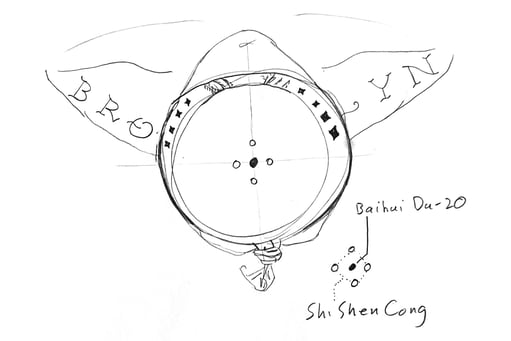

These are great because they help to reduce stress, calm the mind, and they help to open the blood flow to the brain, which assists in reducing swelling and inflammation. And as we know, there's always swelling inside the cranium whenever there's stress, anxiety, or depression.
I also use two needles at the base of the skull, a very important point to open the neck and the circulation to the brain, and also a point traditionally indicated going centuries back, for facial paralysis. This is GB-20, feng chi point.
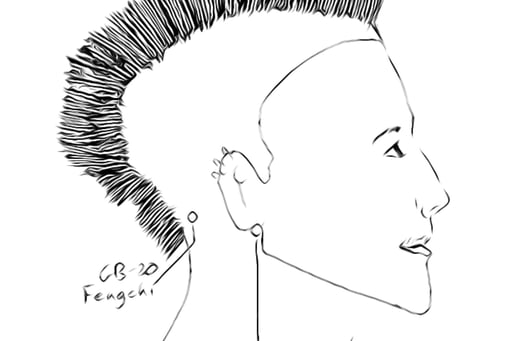

I needle the muscles of the face near where the nerves enter the muscles, those are called the motor points. If there are any ear symptoms like pain
or pressure in the ear, usually a point like SJ-17, and sometimes one of those SI or SJ points around the ear.
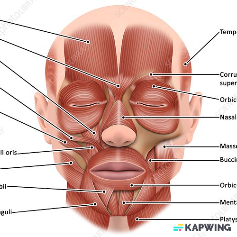

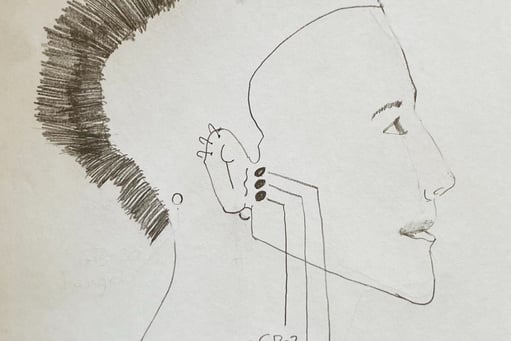

I also like to needle the neck, the back of the neck, and the upper trap and anywhere in the area that I find is tight or tender. And I sometimes manually decompress the neck, although I don't do needling of the face and needling of the neck (needling for the neck is done face-down, needling for the face is done face-up. I don't do those in the same session because I think that's too much for a person who's stressed, fatigued, and healing on such a big scale.
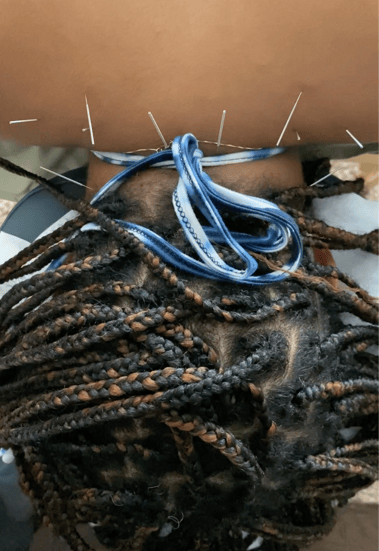

For electro stimulation, any kind will be effective. I prefer microstimulation, because it does increase ATP in the cells, which results in the breakdown of nonfunction tissues more efficiently, and more building up and rebuilding of tissues that we need to function. It's also very very gentle compared to milliampere which is the strong thumping type that you usually get.
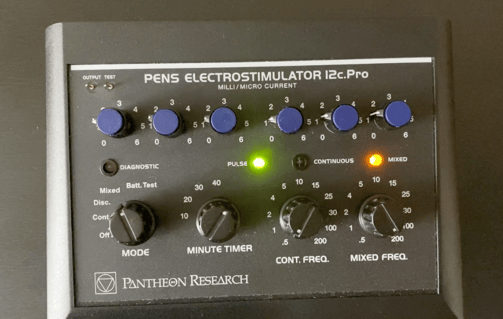

For all you acupuncturists out there, I prefer a mixed frequency using the lowest, and the highest frequency available on the machine, I use a Pantheon Research, which is a very well made machine that has a frequency range of 0.5 Hz - 200 Hz. I set the machine to "Mixed" so that it uses those two frequencies alternating, a few seconds of the low frequency, and a few seconds of the high frequency. The lower frequencies will stimulate the deeper structures including the bones and tendons, and the higher frequencies will stimulate the more shallow tissues like the cells in the muscles and in the skin. The nerves travel both through bone and skin. Using a wide range of frequencies ensures more of the nerve is stimulated.
I also use red & infrared light. The “red" light (red & IR light) is great because it increases the metabolic rate of repair for the skin, muscles, bones, nerves, and tendons. Red light also gets absorbed into the body and gets carried into other places ot have a mild systemic effect. I often recommend red light for my clients at home and I've seen it make a noticeable difference for those with long covid brain-fog and fatigue, concussion symptoms, hair loss, erection quality, panic, and anxiety.
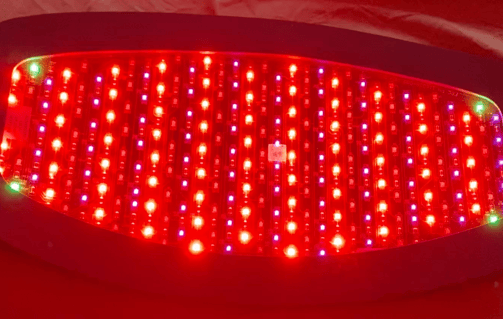

I let that whole treatment work for about 25 minutes, I may let that go longer for someone who's younger, but for the most part it's 25 minutes. There is a metabolic cost to acupuncture, so the longer you leave the needles, the higher the metabolic costs, and the more rest that person needs afterwards just to recover from the treatment, so I try not to wear people out.
Types of Facial Paralysis, Causes, Diagnosis, Treatment in Western Medicine, Stats + Stress & Exhaustion (the primary drivers)
Causes
Temporary facial paralysis on one side of the face is caused by impairment of the Facial Nerve. This is the seventh cranial nerve. It originates inside the skull, on the underside of the brain, like the other cranial nerves. This area is called the brainstem, it's between the brain and spinal cord. Thus, it's in the back of skull and on the bottom of the skull, and is part of the Central Nervous System.
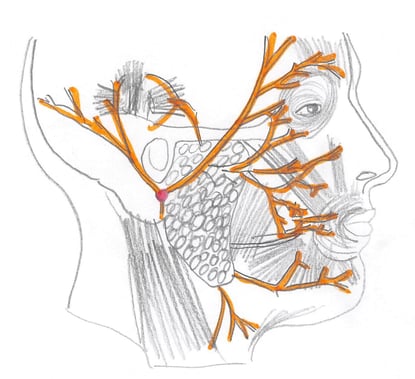

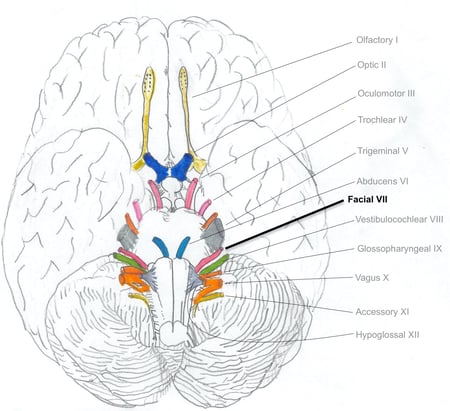

The brainstem is the first of two places where the virus is thought to gather and be stored in its latent stage. Its main nerve travels out of the skull and splits into three smaller nerves at a ganglion (which is like a relay point) just behind the ear. This happens to be at the acupuncture point SanJiao-17. This ganglion is thought to be a second place where the virus can gather and go latent. The three branches then innervate the side of the face and reach the muscles around the eye, nose, and mouth, as well as the tear and salivary glands, and back of the tongue.




Who is affected
Typically, it affects people bwteen the ages of 15 & 45, I didn't find any gender data but I can tell you that in my practice I see both men and women. I see younger people and older people who come in with it, it affects about 40 thousand people int he united states every year. Keep in mind, these are the reported or gathered numbers, and the number of people who get OSFP in a year may be higher tan 40K. It's common enough that I see it 2-3 times per year. Acupuncture can be effective for facial paralysis in all of these cases.
Types / Syndromes
We see it in at least three diseases or syndromes, those are Bell's Palsy, Ramsey Hunte syndrome type 2, and stroke. Also bear in mind that one doctor may diagnose a different cause or syndrome than another. In part, this is because doctors are not doing the tests or their other diligence they need to accurately diagnose. I have seen many patients who come in for OSFP, or concussion, or other neurological injuries, and tell me the doc spent just enough time to make notes in the chart and then they were gone. I believe this is in large part due to the hurried nature that modern heath insurance imposes on a doctors practice, but also is an aspect of laziness. And the recovery rates for all of these are relatively high, so it's not as though an accurate diagnosis makes or breaks a recovery, but wouldn't it be reassuring to know you're on the right track? Up your game docs.
I've treated people who have been diagnosed with Bell's Palsy or Ramsey Hunte Syndrome type 2, as well as people recovering from stroke. The recovery rates are usually quite good, most people recover completely within 6 months, although I have seen people a year later who still have some kind of symptoms. Sometimes all tha's left is an uncomfortable sensation like stiffness or mild soreness.
Treatments & Recovery
Something like 85% of people are really lucky and spontaneously recover within 3 weeks, although the statistics that I saw through the National Institutes of Health didn't say how complete the recovery was in these 85% of people. Recovery is much more complete if you start treatment within 72 hours of the paralysis, and less complete for those who start more than 72 hours after the paralysis.
And a small percentage of people still have significant paralysis, such that they still can't close their eye, this can lead to uncontrollable watering, or a very dry eye, neither of which is easily manageable while at work or working out, or driving, or cooking or taking care of the family, or they cannot close their mouth adequately so eating and chewing are very difficult, and for that small number of people surgey is recommended.
I haven't come accross anyone in my practice or in my patient interviews who had one sided facial paralysis and needed to get surgery, this may mean that it's rare, or that I am simply not seeing these individuals in my practice.
For Bell's Palsy, the treatment of choice is steroids. The stats on steroids are good I don't like steroids at all, but if I had one sided facial paralysis, I definitely would take the full curse of steroids my doctor advised me to take, and I would do acupuncture, I would do both of those as soon as possible, within 72 hours. Recovery is much more complete and much faster if you start steroids within 72 hours of the onset of the paralysis, and it's much lower or incomplete after that.
For Ramsay Hunte syndrome If found, it's also treated with antibiotics.
I didn't look closely at the scientific studies or statistics for how many people get better using acupuncture because I've seen that it's very successful in my own practice, and i have a love hate relationship with research generally but especially with acupuncture research because it's an outgrowth of white supremacy and so closely mirrors other imperialist models such as the debt repayment system the US uses, which is the reason dedollarization is now a thing. But I digress.
Part of my bias against western medical research for acupuncture is also because I've seen that a lot of the studies on acupuncture have contradictory results, or their methods are not that reliable, or the study size is small or the use other therapies in addition like herbal medicine or physical therapy. And of course they all boast good results and percentages but to me, what matters is how much better my patients report they feel, which is always 20-50% improvement after the first session, and 80% or more by the time the healing slows down to what seems like a close. Even 20% can feel like an enormous jump in healing in this situation which feels extreme and unpredictable.
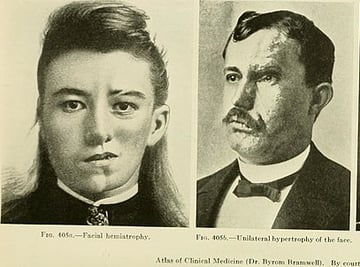

Story from my clinic
And here's the beautiful part -
I don't think I'm doing anything special - my approach may be the result of research, trial and error, and as a result my acupuncture may look different from someone else's, but that really only shows how personalized it is to me and my approach. I know any competent acupuncturist can help you recover because I have seen it.
Thanks for reading / watching - I hope this information has helped someone out there make a decision in getting acupuncture, and seeing a medical doctor to round out the treatment. Feel free to reach out using the contact form for questions, consults, or comments. In exchange, I would love to add you to my mailing list. Thanks, and good luck to you!